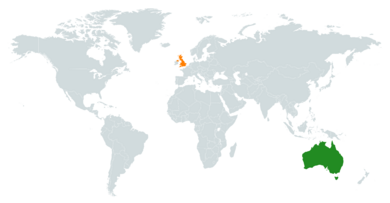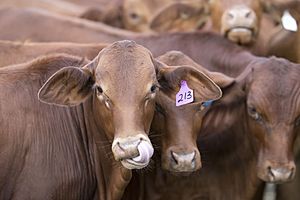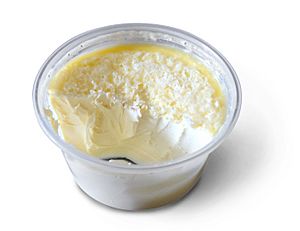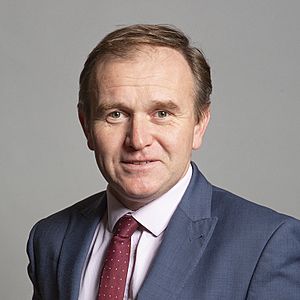Australia–United Kingdom Free Trade Agreement facts for kids

Australia United Kingdom (UK)
|
|
| Type | Trade agreement |
|---|---|
| Context | Trade between the UK and Australia |
| Drafted | 15 June 2021 |
| Signed | 17 December 2021 |
| Location | Virtually in London, UK, and Adelaide, Australia |
| Effective | In force (31 May 2023) |
| Condition | Ratification by both Houses of the Parliament of Australia and the UK |
| Negotiators |
|
| Parties | |
| Language | English |
The Australia–United Kingdom free trade agreement is a special deal between Australia and the United Kingdom. It was signed on December 17, 2021. This agreement makes it easier for both countries to trade goods and services with each other.
This was the first big trade deal the UK made after it left the European Union (a group of European countries). It took almost a year of talks to agree on everything.
One important part of the deal helps Australia sell more beef and lamb to the UK without extra taxes (called tariffs). For people, British citizens under 35 can now get special working holiday visas for three years in Australia, instead of just two. This makes it easier for young people to travel and work in Australia.
Some people in the UK worried that this deal might make it harder for British farmers to sell their products. They were concerned that cheaper Australian food might flood the market. However, supporters of the deal said that Australia might not even send that much food, as it's often more profitable for them to sell to countries closer to home.
Contents
What is a Free Trade Agreement?
A free trade agreement (FTA) is like a special promise between two or more countries. It means they agree to lower or remove taxes (called tariffs) and other barriers on goods and services they trade with each other. This makes it cheaper and easier for businesses to buy and sell things across borders. The goal is to boost trade and help their economies grow.
Why This Deal Happened
The United Kingdom decided to leave the European Union in 2016. This decision is known as Brexit. After leaving, the UK needed to make new trade deals with countries around the world.
Many people in the UK wanted a trade deal with Australia. In 2020, the UK and Australia traded about £13.9 billion worth of goods and services. This deal was a way to make that trade even bigger and better.
How the Deal Was Made
Talks for this free trade deal started on June 17, 2020. It took almost a year of discussions to agree on the main points.
Both the Australian and UK governments shared what they hoped to achieve from the deal. They wanted to make sure the agreement would benefit their own countries.
Farmers in the UK were concerned. They thought that cheaper Australian meat might lower prices for their own products. Australia produces a lot more beef and lamb than the UK. The British government tried to include rules to limit how much Australian meat could come in without tariffs for 15 years.
After a year of talks, the leaders of both countries, Boris Johnson from the UK and Scott Morrison from Australia, met and agreed on the deal.
Key Parts of the Agreement
The agreement covers many different areas to make trade smoother.
What the Agreement Covers
- Trade in Goods: This means how products like food, cars, and electronics are bought and sold between the two countries.
- Sanitary and Phytosanitary Measures (SPS): These are rules about food safety and plant/animal health. Both countries agreed to keep high standards.
- Customs and Trade Facilitation: This makes it easier and faster for goods to pass through customs.
- Rules of Origin: These rules decide where a product comes from, which affects how it's taxed.
- Working Holidays: Young people from the UK (under 35) can now get longer working holiday visas for Australia (up to three years). Australians also have better access to the UK job market.
Why This Deal is Important
This agreement is seen as a step for the UK to join a larger trade group called the Comprehensive and Progressive Agreement for Trans-Pacific Partnership (CPTPP). This group includes countries around the Pacific Ocean.
The British government believes this deal could help its economy grow by about £500 million over 15 years. This is a small but positive boost.
Australian farmers were happy about the deal. They saw it as a chance to sell more of their products to the UK.
Both countries worked to get the deal officially approved. The Australian Parliament passed the necessary laws in November 2022. The UK also passed its laws, and the agreement officially started on May 31, 2023.
Concerns in the UK
Even though the deal was signed, some groups in the UK had concerns.
Farmers and food safety groups were worried. For example, the Pesticide Action Network (PAN) was concerned that the deal might allow Australian food grown with more pesticides to be imported into the UK. They feared this could lower British food safety standards.
Another concern was about "geographical indications." These are special names for foods that come from a specific place, like Cornish clotted cream or Scotch whisky. The agreement did not protect these names, meaning Australian producers could use them for their own products sold in Britain.
Members of the UK Parliament also looked at the deal. Some thought the government rushed to make the deal, which might have meant the UK didn't get the best terms. They also pointed out that the deal would only bring a very small economic benefit to the UK.
Farmers in the UK, especially the National Farmers' Union (NFU), felt that British farmers were being asked to compete with very efficient Australian producers. They wanted more protection for their own farms.
A former UK minister, George Eustice, who helped negotiate parts of the deal, openly criticized it in Parliament. He said the UK gave away too much and got too little in return. He felt the deal was rushed to make the government look good.
Many people also felt that the UK Parliament should have had a chance to vote on the deal, just like the Australian Parliament did. They believed it was important for democracy.
On the other hand, some economists argued that the deal was actually too protective of British farmers. They said that the UK needs imports to feed its population and that protecting certain farming methods might hurt other parts of the economy, like dairy farming.
See also
- List of bilateral free-trade agreements
- Free-trade agreements of the United Kingdom
- Australia–United Kingdom relations
Images for kids
 | Charles R. Drew |
 | Benjamin Banneker |
 | Jane C. Wright |
 | Roger Arliner Young |







